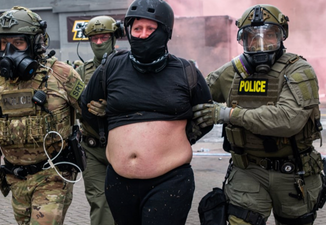
Megha Vemuri, MIT’s class of 2025 president, praised her fellow graduates for protesting against Israel following the Oct. 7, 2023, Hamas terrorist attacks.Boston Globe via Getty Images
| Published May 31, 2025
Class of 2025 president Megha M. Vemuri was banned by the university from Friday’s undergraduate degree ceremony after her disruptive address
At the Massachusetts Institute of Technology’s (MIT) 2025 commencement ceremony, a significant controversy unfolded when Class President Megha M. Vemuri used her speech to accuse the university of supporting Israel’s alleged genocide against Palestinians. This unexpected deviation from the pre-approved speech led to a walkout by several Jewish students and sparked a broader debate about free speech, institutional responsibility, and the role of political discourse in academic settings.
Vemuri’s speech praised student activism following the October 7, 2023, Hamas attack on Israel and cited campus protests and student efforts to sever ties between MIT and the Israeli military. Her remarks, which included claims that Gaza’s universities no longer exist and accused MIT of complicity in the conflict, elicited a mix of boos, cheers, walkouts, and chants from the audience. The speech deviated from the version submitted to university officials, leading to Vemuri being barred from MIT’s undergraduate ceremony the following day.
The incident at MIT is part of a broader pattern of campus activism and administrative responses across U.S. universities. At New York University (NYU), for instance, student speaker Logan Rozos had his diploma withheld after condemning Israel’s actions in Gaza during his commencement speech. Similarly, at George Washington University, graduate Cecilia Culver was banned from campus after calling for divestment from Israel during her commencement address.
These events underscore the complex dynamics universities face in balancing free speech, institutional policies, and the diverse perspectives of their student bodies. As debates over the Israel-Palestine conflict continue to resonate on campuses, institutions grapple with maintaining inclusive environments while addressing the concerns and rights of all students.
Multiple students at the Massachusetts Institute of Technology (MIT) walked out during the commencement ceremony after Megha M. Vemuri accused the university of wiping “Palestine from the face of the Earth.”FOX News
Video obtained by Fox News Digital reveals that Vemuri’s comments drew a mix of boos and cheers.FOX News
Watch the latest video at foxnews.com
MIT graduates seen walking off while commencement speaker delivers address
MIT graduates walk off and others chant ‘shame’ as commencement speaker accuses school of being complicit in aiding “genocide” in Gaza war.
The MIT commencement speech controversy has several key implications—social, political, and institutional:
1. Free Speech vs. Institutional Guidelines
-
Implication: The tension between allowing free expression and maintaining approved, non-political spaces—especially at ceremonies—could lead universities to revise or tighten policies on graduation speeches.
-
Potential Outcome: Increased vetting or even censorship of student speech, potentially sparking backlash from advocacy groups and civil liberties organizations.
2. Campus Polarization Intensifies
-
Implication: Incidents like this deepen divisions among students, particularly between pro-Israel and pro-Palestinian groups.
-
Potential Outcome: More protests, walkouts, and calls for administrative accountability as students seek to align campus policies with their political and ethical beliefs.
3. University Reputation and Donor Influence
-
Implication: Allegations of “aiding genocide” or silencing dissent can damage an institution’s global reputation and affect relationships with alumni, donors, and research partners.
-
Potential Outcome: Universities may face pressure from both sides—donors who support Israel and activists demanding divestment—impacting funding and policy decisions.
4. Legal and Ethical Challenges
-
Implication: Disciplinary actions against students for political speech could prompt legal challenges based on First Amendment rights (especially at public universities).
-
Potential Outcome: Legal precedents may be tested or established about the scope of permissible speech in educational settings.
5. National Spotlight on Student Activism
-
Implication: MIT’s incident adds fuel to the nationwide scrutiny of student activism around the Israel-Gaza conflict.
-
Potential Outcome: Politicians and advocacy groups may use such events to support broader narratives about antisemitism, Islamophobia, or academic bias in the U.S.
Overall Takeaway:
U.S. campuses are becoming flashpoints for global political tensions, especially surrounding the Israel-Gaza conflict. The walkout and backlash following a student’s unsanctioned remarks highlight how universities are struggling to balance free speech, political activism, and community sensitivity in highly polarized times.
More broadly, it shows that even ceremonial events like graduations are no longer immune from geopolitical debate—and institutions will increasingly be forced to define their roles in that conversation.
SOURCES: FOX NEWS – Jewish students walk out after MIT commencement speaker accuses university of aiding Israel’s ‘genocide’
THE NEW YORK POST – Jewish students storm out of MIT commencement after class president accuses university of aiding Israel’s ‘genocide’
THE FORWARD – MIT disciplines student commencement speaker who condemned school’s ties to Israel as ‘complicit in genocide’







Be the first to comment